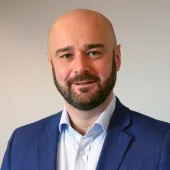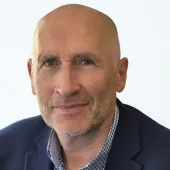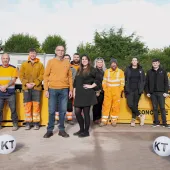Breedon Group: Recent Acquisitions and Deals

First published in the July 2018 issue of Quarry Management as New Opportunities
Breedon Group chief executive officer Pat Ward talks to Quarry Management about the group’s recent acquisitions, including its biggest yet – the Irish Lagan Group – plus an elegant deal with CRH/Tarmac, and how they impact on the Breedon operation.
Breedon Group’s £455 million acquisition of the Irish Lagan Group in April might have seemed like a judicious step into the Eurozone ahead of whatever Brexit might bring. But that was not the point, says Breedon’s chief executive officer, Pat Ward. ‘For us, the primary focus was always the UK,’ he says, ‘but we were always being asked when we were going to look beyond those borders.’
The Lagan Group, Breedon’s most expensive purchase to date, answered that question. But Mr Ward says: ‘It wasn’t about going into the Eurozone. It was a business opportunity. They had the scale of operation to give us critical mass in the Irish market.’
He is sanguine about Brexit. ‘I don’t think it’s that relevant,’ he told QM. ‘The businesses we bought in Ireland are good, solid assets in a market that is growing faster than the UK. We can never rule out expanding in the EU, but our aim is to prioritize growth in Great Britain and Ireland.’
Why Lagan? Part of the answer is that Breedon already had a relationship with the group through Lagan’s Whitemountain construction materials and contracting business that operates throughout the UK. They had formed a joint venture on the Aberdeen by-pass (or Western Peripheral Route), the longest section of highway being built in Scotland.
What Lagan bring to Breedon is extensive. There are 10 active quarries in Northern Ireland and the Republic, and six more which can potentially be reopened, together with 11 asphalt plants (plus a number of mobile units) and two bitumen import/export terminals at the ports of Dublin and Belfast. There is a cement manufacturing plant and cement terminal, ready-mixed concrete and concrete products manufacturing facilities, and brick and clay products works. Then there are Lagan’s sizeable contract surfacing and highway maintenance businesses, plus Welsh Slate.
Although Lagan have had contracting operations in Great Britain for many years, Welsh Slate are their only quarry-based business in GB. Acquired in 2007, they are the largest producers of slate in Wales. From their quarries at Penrhyn and Cwt-y-Bugail they produce slate for roofing, architectural and consumer products, and decorative aggregates. Breedon say Welsh Slate represent a ‘really interesting and valuable’ addition to their decorative aggregates business. Being a global brand, they have an established distribution network that Breedon can use for the expansion of their own decorative aggregates.
In fact, the acquisition of Lagan has, says Mr Ward, made Breedon think more about down-the-line products, with Lagan’s brick and clay products plants in the Republic of Ireland and the concrete tile production plant just outside Belfast. He says this is being evaluated in more detail in terms of what it can mean for the group.
‘Lagan have brought some significant opportunities for Breedon – more than we anticipated.’
Although the Lagan acquisition has given Breedon instant critical mass in Ireland, north and south of the border, part of the attraction was Lagan’s established routes into new areas of GB with both products and contracting. Breedon believe the products brought to GB can be increased, offering the potential particularly to expand the group’s presence in the south-east of England by delivering aggregates along the Thames.
Breedon, traditionally operating mainly in the Midlands, northern England and Scotland, had already increased their presence in the wealthy south-eastern corner of England thanks to what was until Lagan their most expensive purchase, that of Hope Construction Materials for £336 million.
In 2016, when Breedon bought Hope, they called the acquisition the most significant development in their history, creating a truly national business with operations extending from Stornoway in the far north of Scotland to Dartford in Kent, and from Abergele in Wales to Great Yarmouth in East Anglia. Lagan are certainly no less significant, adding two new geographical divisions to the group, in the Republic of Ireland and Northern Ireland, and expanding the cement division, with a new plant to complement Breedon’s Hope works in Derbyshire.
Investors showed their support for the purchase of Lagan by buying £175 million of shares to part-finance the deal – in fact, the equity issue was significantly oversubscribed. Breedon’s banks were equally supportive, providing the company with a new £150 million term loan and £350 million revolving credit facility, enabling Breedon to fund the balance of the purchase price and pay down around £100 million of existing debt.
That has pushed borrowing up to 2.6 times earnings, about what it was after the Hope purchase, but Breedon are comfortable with that because it is not a level of gearing Mr Ward wants or expects to last too long. After Hope, the debt level was reduced to below one times earnings in about 20 months. Mr Ward believes the same sort of reduction of debt can be achieved in a similar time scale now, which would, of course, leave Breedon ready for their next big purchase.
The company has stated previously its intention to deliver a 15% profit margin (before interest and tax) by 2020. Hope pulled that back and Lagan has pulled it back a little further, but ‘the target is nothing we haven’t seen achieved before,’ says Mr Ward. ‘We might need to look at when we get there – it might be after 2020.’
These major acquisitions, as well as the continuing smaller bolt-ons and infills, all have potential for margin improvement in them, not from asset-stripping but from exploiting the synergies – an important part of the Breedon success story.
‘We have identified £5 million of synergies in Lagan, including taking some costs out of the business,’ says Mr Ward. ‘The three individual businesses each had a head office, plus the Lagan Group HQ, which we obviously don’t need. So we have reduced those costs and also identified some administration benefits going forward.’ With Hope, Breedon said they would take £10 million of costs out of the business in three years. In fact, they did it in two. ‘We tend to get on with it,’ says Mr Ward. ‘We are flat-structured, so make quick decisions. Pulling the businesses together should be relatively easy.’
The smaller add-ons also benefit from the head office skills at Breedon, now housed in smart new purpose-built premises that opened in July last year overlooking the quarry at Breedon on the Hill, Derbyshire, from which the group takes its name. They are spacious. There is even room to spare, which just reinforces the level of expansion that might be expected still to come from the Group.
Which brings us to Breedon’s second big strategic move this year. As QM went to press, the company was completing the purchase of four UK quarries from CRH’s Tarmac in exchange for 23 of Breedon’s concrete plants and £6.1 million in cash. ‘This may not have attracted quite the same attention as Lagan,’ says Mr Ward, ‘but we have succeeded in quietly concluding a deal with CRH that has a major impact on our business in the UK.
‘The asset swap gives us 25 million tonnes of reserves, including a rare source of high-PSV stone in Wales, and a new 50,000-tonne-capacity asphalt plant. It also gives us a significant new source of hardstone in the heartland of our Scottish business, at Daviot Quarry, near Inverness, where we already have an asphalt plant.
‘At the same time, we are streamlining our concrete network, relinquishing peripheral plants that we couldn’t supply with our own stone and which in many cases were on short-term leases. We’re now much more self-sufficient, with nearly 900 million tonnes of aggregates reserves and resources in the UK and Ireland.
‘It’s also a great example of how we can partner with our larger peers, in this case CRH, to do elegant deals which work for stakeholders on both sides of the deal.’
But Breedon are not just about acquisitions. They also have an impressive record of organic growth. This tends to go under the radar outside of the areas directly affected. It usually involves extensions to existing quarries or adding value by, for example, putting a ready-mixed concrete plant into a quarry. It is up to managers at the sites to propose such organic growth and they have shown no reluctance to do so. ‘We continue to invest over 100 per cent of depreciation back into the business. Pleasingly for us, there’s no shortage of investment proposals coming forward from our businesses.’
Breedon have also opened three new quarries in Northamptonshire, Co. Durham and outside Glasgow. Opening new quarries takes a long time and is expensive, although Breedon accept the importance of environmental and social assessments. Mr Ward: ‘We want to make sure we understand the environmental issues and we want to be good neighbours.’
Logistics is another key area of focus. Breedon operate railheads and shipping as well as a lot of trucks on the road. ‘Haulage logistics is a key focus for us. That was identified after Hope,’ says Mr Ward. ‘We have made some progress, but not enough. Aggregate production, we get it. But logistics... We get information but we don’t always know what to do with it, optimally. We have recruited from outside our sector to get the logistics people we need. It’s value added, not cost. It’s margin.’
Certainly Pat Ward has shown every indication of continuing the growth and improved performance of the Breedon group seen under his predecessor, Simon Vivian. And there are no shortages of potential targets for future takeovers. Mr Ward says there are still about 200 independent quarry operators in the UK and perhaps 100 or so in Ireland.
The signing off of the Hope purchase came just after Mr Ward had become chief executive officer in January 2016. He came from Aggregate Industries, where he had been CEO of AI Europe (based in England) since April 2014, after having run AI businesses in America since 1999.
He had started with Aggregate Industries when it was Bardon Aggregates, 22 years ago, and he says there are a lot of similarities between Bardon then and Breedon today. Aggregate Industries expanded and were taken over by Holcim and then merged with Lafarge. Which begs the question of how long Breedon can remain Breedon as they expand, assuming a hungry multinational does not consume them.
Breedon have always celebrated their independence, which has made them an attractive proposition for some executives in the multinationals – three of their senior level managers come from just that background. But they do not come in and change the Breedon culture. Mr Ward likes the culture created by Simon Vivian and Group chairman Peter Tom. The company has a flat structure that requires people to stand up and be recognized, taking decisions and taking responsibility for those decisions. It is not for everyone.
Mr Ward: ‘People can come here and flourish with the responsibility or they can’t do it because they don’t have the backing behind them that they are used to in the multinationals. For us, a key is to make sure we get the right people – those who will flourish with us, not those who will try to recreate what they had before. If we get the right people, it will be liberating for them.’
That does not mean they cannot improve, and Breedon are keen on training. A focus of that training, following the industry’s disappointing health and safety slide last year, has been on communication skills. Breedon have now engaged a third party to train their managers in these ‘soft’ skills.
Mr Ward: ‘We were comfortable that they had regulatory training but we felt we needed to give management softer skills on leadership. Some 220 people will go through this process. These are life skills, not quarrying skills. A lot of these individuals were long-term people. Our training has been on how to operate equipment; so much technical-based training. But there are perhaps 15 people working in a quarry and the managers have to engage with them. It’s teaching people to engage the people they are talking to. These soft skills are what we are trying to give people. We see that as a focus.’
Skills in the boardroom are no less crucial. Simon Vivian remained on the board as a non-executive director after Pat Ward’s appointment. At this year’s AGM it was announced he was leaving and the board would look for two new non-executives to replace him. Will Breedon take the opportunity to increase the number of women in an industry that has been criticised for not attracting women?
Mr Ward says the non-executives appointed will be ‘the best people for the role’.
‘We always have to be conscious of issues because as society and business moves forward we have to keep pace with it, but you have to have the best individual for the role. Each of the non-executives has talents that we require and we will be a bit flexible about how we resource those. We already have a very talented woman on the board. We need one or two more non-executives now Simon has gone. It’s just planning for the future. Good governance dictates that there is a limit to the length of time people can serve as non-executive directors.’
Mr Ward has a lot of faith in Breedon’s strengths and is optimistic about the future. He says when he returned to the UK from America he was appalled at the state of the roads and they have not improved since then. It is investment that cannot be put off for much longer. Then there’s the HS2, which is going to create a massive requirement for aggregates. And there is a political will to increase house building and alleviate shortages of accommodation. Mr Ward believes the UK can help itself and, he says: ‘I’m a great believer in self-help.’
Breedon post Lagan and Tarmac
- Revenue: £901 million*
- Underlying earnings before interest and tax: £106 million*
- Margin: 11.8%*
- Mineral reserves and resources: nearly 900 million tonnes
- Number of quarries: 70+
- Cement plants: 2
- Asphalt plants: 40
- Ready-mixed concrete and mortar plants: c.180
- Concrete, brick and clay products plants: 9
- Contract surfacing businesses: 4
- Import/export terminals: 6
- Slate production facilities: 2
- Number of people employed: c.3,000
* Pro forma for year ended 31 December 2017
- Subscribe to Quarry Management, the monthly journal for the mineral products industry, to read articles before they appear on Agg-Net.com








